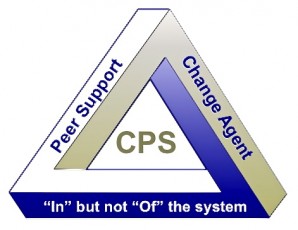

The leadership at Recovery Innovations decision to eliminate the WRAP requirement was done in an effort to qualify more students through for PET training, which they are cranking out in ever greater numbers in an assembly line approach already. Pictured here: Certified Peer Support (CPS) change agents model – within the system not of it!
Overall Peer Employment Training at Recovery Innovations Inc., is pretty good, especially when you compare it with similar programs in Arizona and across the nation. But, there has been an effort to “dumb it down” by removing the WRAP requirement.
Which in my opinion is a huge mistake!
WRAP stand for “Wellness Recovery Action Plan”, and its a course of instruction designed specifically to offer hope in recovery by helping people better manage their psychiatric symptoms and problems. This involves creating action and wellness plans on what to do when you are in psychiatric crisis or experiencing difficulties or problems associated with your illness.
See video: WRAP Mental Health Matters – Wellness Recovery Action Plan http://www.youtube.com/watch?v=LdZ4bmwY9G4
See also: WRAP Changing Course: New Directions Mary Copeland http://www.youtube.com/watch?v=_u5zvaE6LE4
Because of this some students were having difficulties in PET, in terms of acting out in ways deemed unhealthy.
In some case this was more than just a benign nuisance, but was a real distraction to other students, particularly those in the intensive condensed course over two week, of 5 – 8 hour days of classroom instruction.
This might not have been such a problem in those courses that were not as condensed as the two week 80 hour program.
The leadership at Recovery Innovations decision to eliminate the WRAP requirement was done in an effort to qualify more students through for PET training, which they are cranking out in ever greater numbers in an assembly line approach already.
So it appears the effort is being streamlined and dumbed down rather than standards and expectations being raised. In other words the emphasis is more on meeting minimum standards rather than demanding a higher standard on the part of students participating in the program.
See WRAP interview Courage http://www.youtube.com/watch?v=UsVdg4S_62s
Of course, you don’t want to make the standards so high that nobody can meet them, but at the same time you have to expect more of these people who are destined to play a huge role in the reform process within the mental health industry.
Admittedly change is agonizingly slow within the system and the value of peer support is still not fully embraced at every level of the system like it should be.
In addition there is a glut in PET graduates in Arizona with roughly 4 of 10 graduates being unable to land a job in the field, simply because they don’t exist right now.
Currently those employers who do hire peer support personnel are becoming more selective in their hiring practices, choosing to hire only those with 1 year or more experience in the field, or who have participated in an internship program, which is structured and supervised, for obvious reasons.
The only exception to this are those employers who hire people in advance and pay to have them attend PET and are placed immediately in their respective job positions upon completion of the program.
Unfortunately you can’t really discuss this with leadership at Recovery Innovations Inc., because it is critical of their program. Any criticism, in almost any form is seen as non recovery. This stifles and suffocates those opportunities to address issues and point out problems or concerns.
This is not just a problem at Recovery Innovations Inc., but a problem, generally speaking within any organization in the mental health industry. By nature people don’t embrace criticism that well and would rather go along to get along that deal with problems for the betterment of their organization and the people they serve. I suppose the easy for me to say, l have nothing to lose by speaking out – no one can fire or threaten me by firing me from a position, so the have no leverage on me.
This is not to say that speaking out is not without its cost.
I have lost opportunities for employment at both Recovery Innovations and my own provider network and clinic where I receive service to work in the field of peer support because l have dared to speak out on issues that l see are problems within the system.
So l wouldn’t recommend it to people, especially to those who have families to feed and careers to manage. Because in the end its easier for management to just shut down dissent within an organization than to deal with it, in many cases.
